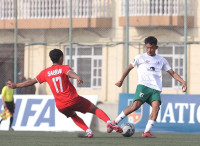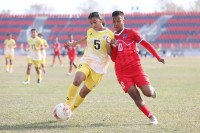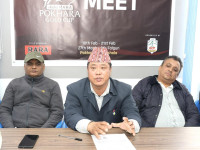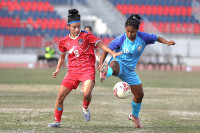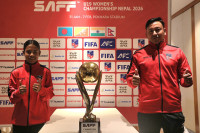Football
Nepal women footballers in high spirits after ‘intense’ training sessions
They say the new head coach has injected fresh energy in the squad ahead of their visit to Uzbekistan for the group-stage qualifiers of the 2026 AFC Women’s Asian Cup.
Post Report
On June 6, during his first press conference as the head coach of Nepal women’s football team, Partick De Wilde expressed ignorance about the capabilities of the players he was going to lead.
“Maybe after a week, I can speak more clearly about what they can do,” said the UEFA pro-license holder, the first person with that distinction to coach the team. “And what I can.”
Now, a little over two weeks since he began coaching, Wilde is more knowledgeable about the team, widely considered the ‘golden generation’ of Nepali women’s football. And he said he was happy with the experience.
“[I have spent] 20 years in coaching, 14 years as an instructor,” Wilde said on Monday, while speaking to journalists after a function organised to bid farewell to the team ahead of their departure to Uzbekistan for the group-stage qualifiers of the 2026 AFC Women’s Asian Cup. “What I found here was amazing, a pleasant experience in my life.”
When asked if his squad was ready to beat the likes of Uzbekistan and head to the Women’s Asian Cup in Australia next year, he suggested being ‘realistic’ with their goals, an expression he has repeated since his first day.
He, however, did not mean that his squad would not be able to pull off an upset. Nepal currently sit at the 100th position in FIFA ranking against Uzbekistan’s 51st.
“We play Uzbekistan at the end,” he said. “We need to shift our focus to the previous opponents—Laos [ranked 107th] and Sri Lanka [159th].”
Wilde added, “We must dream, but each dream takes time. It is not something we can achieve overnight.”
Nepal’s leading goalscorer Sabitra Bhandari ‘Samba’ argued that the team would not take the games against Laos and Sri Lanka lightly.
“We know our main focus is Uzbekistan, but Sri Lanka are also giving us trouble in recent times,” Samba said. “Every game is important. All teams are in good shape.”
Samba also said that Wilde’s efforts transcended language and other barriers. “We would have benefited more if we had such a coach sooner,” said Samba. “The coach even gives us motivation classes to help us cope better.”
Similarly, Nepal’s skipper Anjila Tumbapo Subba stressed that the appointment of the new head coach had brought fresh energy and motivation to the squad.
“We have experienced many positive changes with the new coach,” Subba said. “Regarding the players, everyone is improving. The team spirit is unparalleled.”
The first game of the qualifiers, against Laos on June 29, will also be Nepal’s 100th fixture in their 40-year-old international football journey. “It does not sound right, just 100 games in 40 years,” skipper Subba said. “I have played around 50 games in 10 years. We must play more.”
Subba is currently the most-capped active player in the national women’s team, having represented the nation 57 times. Samba, who has 54 caps for the national team, also said that she was happy to be playing in the Asian Cup qualifiers for the first time.
The only other players to have over 50 appearances for Nepal are Gita Rana (55), Amrita Jaishi (56), Anita Basnet (55) and Renuka Nagarkote (53).
Samba, who played in France’s top division league last season, stressed that the training with the new coach was extreme. “There is no certainty of the players who would make the playing set as the improvement in training sessions would be the major criteria,” she said. “Even I am not sure if I would start in every game. This has made everyone excited.”
Wilde acknowledged that he had “some intense training sessions.”
“But I am surprised there was no injury,” he said. “This is the first time I experienced it in my career.”
After facing Laos on Sunday, Nepal will take on Sri Lanka on July 2 and Uzbekistan on July 5. The team is leaving on Tuesday evening.
Hari Prasad Lamsal, secretary at the Ministry of Youth and Sports, was at the farewell event to hype the team up.
“It is an honour to represent the country, and not everyone gets that chance,” Lamsal said. “We know there is a shortage of support for the sport, but we hope that our girls will utilise the resources they have been provided with—to win and make the country and its people proud.”




 12.12°C Kathmandu
12.12°C Kathmandu
